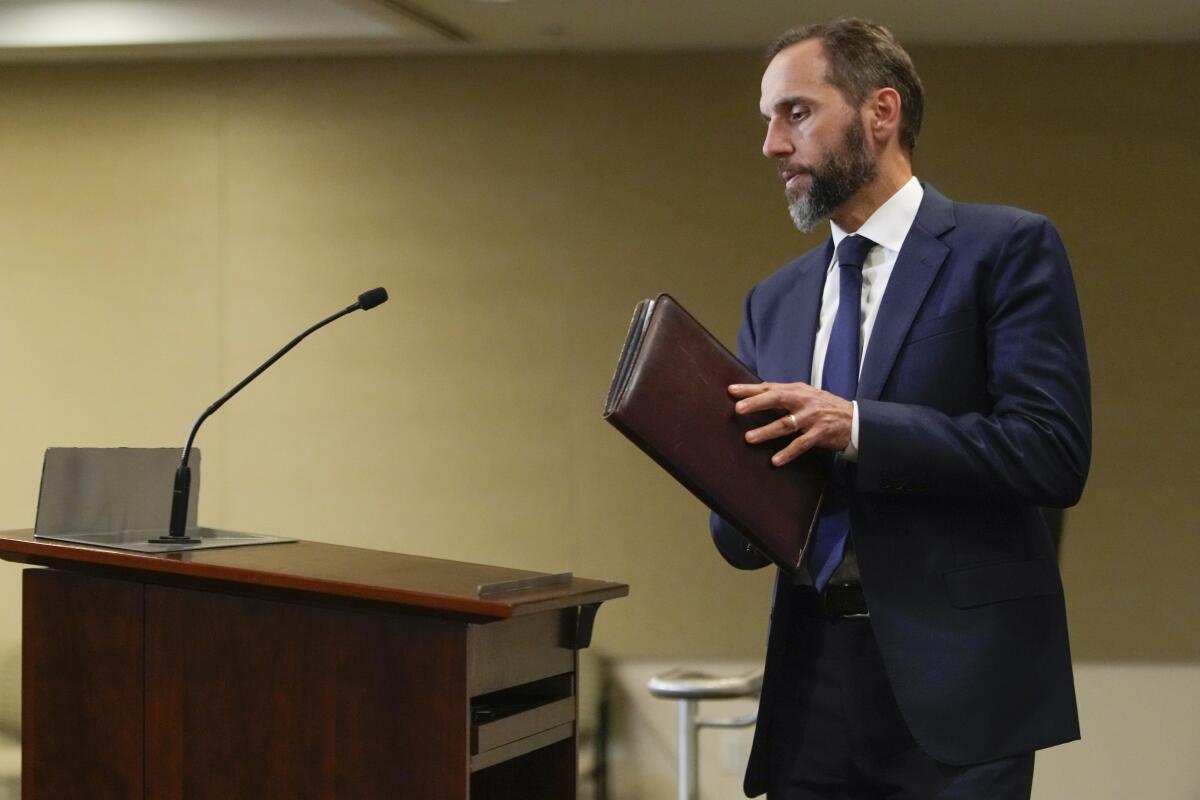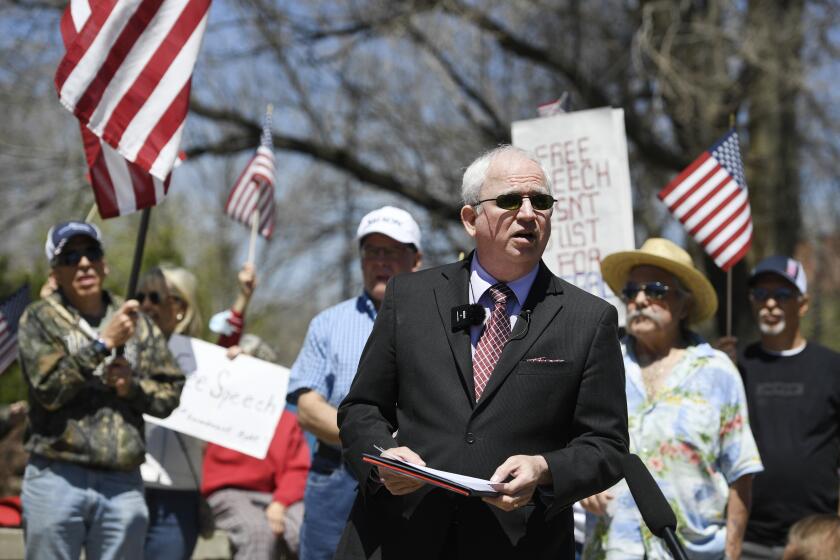Column: How Jack Smith’s risky but clever maneuver in the Jan. 6 prosecution puts Trump in a bind

- Share via
Special counsel Jack Smith’s petition Monday for expedited Supreme Court consideration of Donald Trump’s claim of immunity from prosecution was a rare, risky and masterly move. It’s likely to upend Trump’s chief strategy of delaying the federal Jan. 6 trial until next year’s election.
Smith won on the immunity question in the trial court, where U.S. District Judge Tanya Chutkan meticulously analyzed the relevant text, history and structure of the Constitution before rejecting Trump’s claim of absolute immunity from prosecution for his conduct as president. Trump’s lawyers promptly appealed to the U.S. Court of Appeals for the D.C. Circuit.
The standard playbook would suggest sitting tight while forcing Trump to press the issue in the higher courts. But Smith realized that Trump could string out the review process by plodding through every possible step, preventing the Supreme Court from taking up the issue soon enough to allow a trial before the November election. And if Trump is elected, he could simply end the federal prosecution.
So the special counsel wisely decided to jump ahead. The credit probably belongs to Michael Dreeben, a former deputy solicitor general and a distinguished criminal law specialist.
Special counsel David Weiss brought the tax charges in Los Angeles. It’s a suspiciously tough case in the shadow of a Republican effort to impeach President Biden.
Known as a petition for certiorari before judgment, such a move to skip the circuit court is rare: The court has allowed it in few cases, though a disproportionate number have been in recent years. The Supreme Court’s rules reserve the possibility for cases that are of “such imperative public importance as to justify deviation from normal appellate practice and to require immediate determination in this Court.”
The Jan. 6 prosecution is a relatively easy lift for application of this rule. Smith’s team didn’t even argue the point at length, asserting concisely and persuasively: “It requires no extended discussion to confirm that this case — involving charges that respondent sought to thwart the peaceful transfer of power through violations of federal criminal law — is at the apex of public importance.”
Judge Tanya Chutkan granted a motion by special counsel Jack Smith’s team requiring the ex-president to reveal whether he will blame his lawyers for his conduct.
The prospect that Trump could use his immunity motion as a vehicle for delay is particularly worrisome given that, for a variety of reasons, the other major cases against him are unlikely to be tried before the election.
It’s a promising sign for Smith that the Supreme Court jumped on the question with the urgency the special counsel advocated. It ordered Trump to submit a brief by next Wednesday, which is warp speed by the court’s standards, suggesting the justices are also keenly aware of the calendar.
Indeed, the court might welcome Smith’s motion. If the immunity issue were to come to them much later, they would be taking it up in the shadow of the election.
There is a precedent for granting Smith’s petition not just on the merits but also in its timing. United States vs. Nixon, in which the court ruled unanimously against the president’s assertion of executive privilege and effectively forced his resignation, proceeded according to the same expedited process. It’s worth noting that Justice Brett M. Kavanaugh, who passes for this court’s center, extolled the case during his confirmation hearing as one of the court’s shining moments.
Another virtue of the maneuver is that it puts Trump in a bind. His lawyers more or less have to agree that the court should consider the immunity issue even though he would prefer them to do so later. He will be hard pressed to mount a cogent argument against proceeding expeditiously; even if he does, the court is likely to reject it.
It’s true that Smith has taken a risk: The court could shut the case down on immunity grounds sooner rather than later. But if that is to be the ruling, Smith might as well know as soon as possible, when he can still can change direction. He could, for example, focus on his case against Trump for mishandling classified documents, which involves his conduct after his presidency and therefore presents no immunity issue.
And if Smith’s gambit pays off in the form of a prompt adjudication of the immunity question (or, less likely, a decision not to take it up), the whole country will reap the rewards. Americans will be far more likely to go to the polls in November knowing whether one of the candidates is not just a convicted felon but the perpetrator of perhaps the most serious crime against the Constitution in our history.
Harry Litman is the host of the “Talking Feds” podcast. @harrylitman
More to Read
A cure for the common opinion
Get thought-provoking perspectives with our weekly newsletter.
You may occasionally receive promotional content from the Los Angeles Times.












